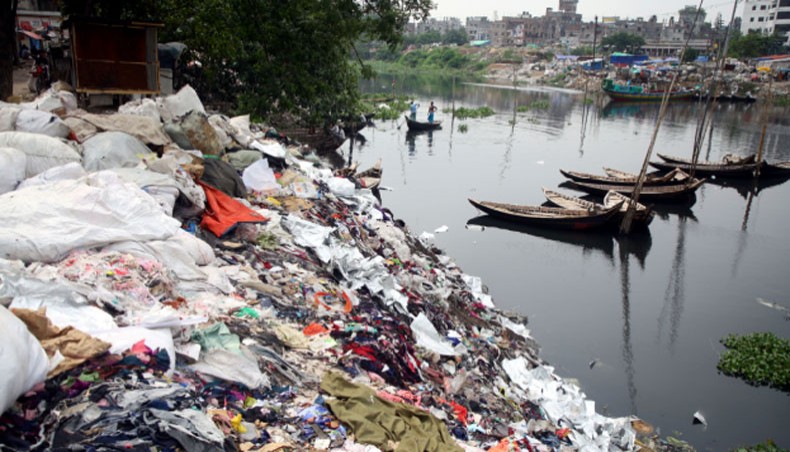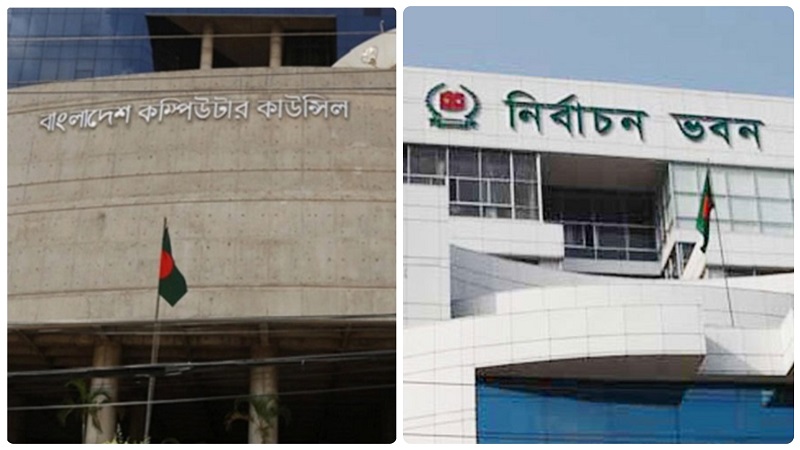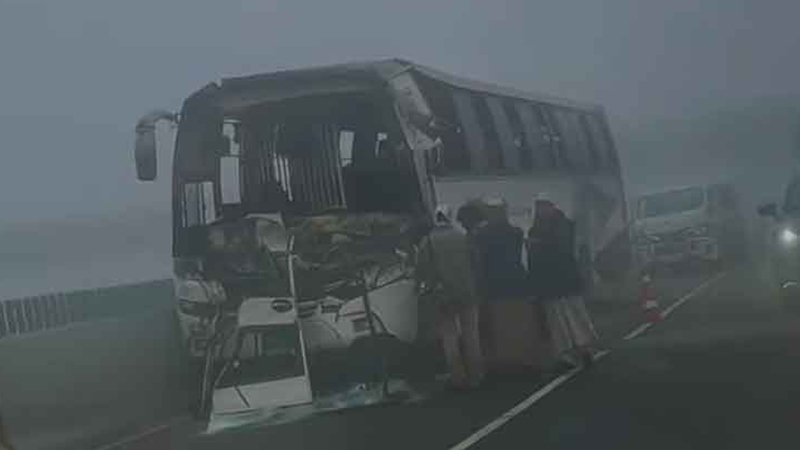All sorts of urban waste continue to get dumped into rivers, canals and other water bodies through storm drainage networks in Dhaka and elsewhere in the country, posing serious public health hazards.
Urban planners said that errant people kept discharging sewerage, solid, industrial and chemical pollutants into surface pipelines constructed for fresh rainwater outfall, which carried them into water bodies without treatment.
Green activists urged the government to stop the pollution, which made river water unusable and hazardous for humans, animals and plants.
They blamed local government bodies, including municipalities, city corporations, water supply and sewerage authorities, and the department of the environment for their failure to check pollution.
Officials of the agencies, however, blamed city residents for littering water flows and the illegal connection of their sewerage lines with the surface drainage causing pollution to cities and towns.
Fazle Reza Sumon, president of the Bangladesh Institute of Planners, stated that in urban areas, storm water should ideally be clean water that would fall into a river without treatment.
‘The reality in Bangladesh is that storm drain water in urban areas is getting polluted by solid waste, waste water and even other more hazardous waste like a medical waste for the lack of proper management,’ he said.
Manjur A Chowdhury, chairman of the National River Conservation Commission, said that faecal sludge and organic waste were being disposed of in rivers through drainage, threatening river biodiversity.
‘Such pollution endangers the aquatic environment of rivers as rivers lack dissolved oxygen for faecal waste,’ he said. He found that agencies were careless about stopping such pollution.
Dhaka Water Supply and Sewerage Authority managing director Taqsem A Khan admitted that sewerage water was getting into rivers through storm drainage lines.
He, however, denied the responsibilities, saying that the city corporations were responsible for managing the drainage lines.
He said that many landlords illegally linked their sewerage lines with storm drainage as their houses do not have septic tanks and sock pits as specified in the plan approved by Rajdhani Unnayan Kartripakkha.
Manjur, however, opined that as sewerage treatment in each house was not possible, Dhaka WASA must ensure sewerage service according to its mandated responsibility.
Dhaka North City Corporation in December 2021 conducted a drive to disconnect such lines, but that did not go long.
DNCC chief executive Md Selim Reza said that they had informed house owners about the negative impact and showed available technologies as a way out.
‘We will conduct mobile court and disrupt all the illegal connections by December,’ he said.
‘We kept banana trees ready to stop pipelines discharging sewerage waste into storm pipelines,’ he said.
Urban planners said that Rajuk had failed to check it while Dhaka WASA had failed to install a sustainable sewerage network over the years.
‘Responsible agencies failed to monitor the illegal sewerage lines and waste dumping in drains, causing pollution,’ Bangladesh Institute of Planners president Sumon said.
He said that Rajuk was responsible in Dhaka for checking whether the house owners’ built septic tanks and soak pit were constructed according to the Bangladesh National Building Code properly or not, and the City Corporation must check it too.
Rajuk board member (development control) Tanmoy Das said that they were working their best but hundreds of buildings were being constructed in the 1,528km Rajuk area.
‘When we pass the building plan, we ensure everything, but during construction, landowners deviate from it, something which we cannot check for lack of manpower,’ he said.
He asked people to obey the plan as Rajuk alone could not make Dhaka a planned city.
According to Abdul Goni, vice-president and mayor of Savar municipality, most municipalities lack a waste dumping facility, and sewerage treatment is a long way off.
He said that until the municipalities were strengthened and facilitated, pollution could not be stopped.
Bangladesh Poribesh Andolon general secretary Sharif Jamil said that many industries had been dumping untreated chemical waste through the drainage line for poor monitoring of agencies.
Several studies conducted on rivers including the Meghna, Turag, Karnaphuli, and Pasur between 2016 and 2017 found 10 heavy metals in water, sediment, and fish at an optimum level.
Mir Mohammad Ali, Aquaculture Department chairman of the Sher-e-Bangla Agricultural University told New Age that in a study in 2017 he found arsenic, chromium, cadmium and lead in sediments and water of the river Karnaphuli.
‘Certainly, these heavy metals are entering the human body through the food chain,’ he said.
The pollution in Dhaka has reached a level where the Dhaka WASA cannot treat the water from any of the four rivers—Buriganga, Turag, Balu, and Shitalakkha—surrounding the capital.
Green activists said that factories dealing with medicines, readymade garments, dyeing, cement, and other products have been discharging chemicals and industrial waste into the rivers.
The Bangladesh Inland Water Transport Authority reported that around 350 metric tonnes of toxic waste are dumped into rivers every day by about 7,000 industries and other residential areas in greater Dhaka and adjacent areas.
Joshadhan Pramanik, the founder and coordinator of the Project for Ensuring Food and Shelter for the Birds in Banpara, Natore, said that to stop such pollution he had been urging different agencies since 2017, but his appeal fell on deaf ears.
He said that in 2018 he complained to the water resources ministry about pollution and asked them to stop river pollution.
He said that following his repeated initiative, the Local Government Division asked the Local Government Engineering Division, the city corporation, municipalities, and the city’s water supply and sewerage authorities to take the necessary steps to stop such pollution.
‘But no practical action was taken till today, so pollution went unabated,’ he said.
Syeda Rizwana Hasan, chief executive of the Bangladesh Environmental Lawyers Association, said that pollution is a punishable offence under laws such as the Bangladesh Environment Conservation Act of 1995 and the Bangladesh Water Act of 2013.
‘If the responsible agencies violate laws that inspire others to do so,’ she said.
In Bangladesh, over 80 metric tonnes of sludge are generated every day and another 25 metric tonnes of sludge are generated every day in urban areas.
Jahangirnagar University urban planning professor Akter Mahmud said that considering the reality, the authorities might treat runoff wastewater before it is disposed of in rivers.













